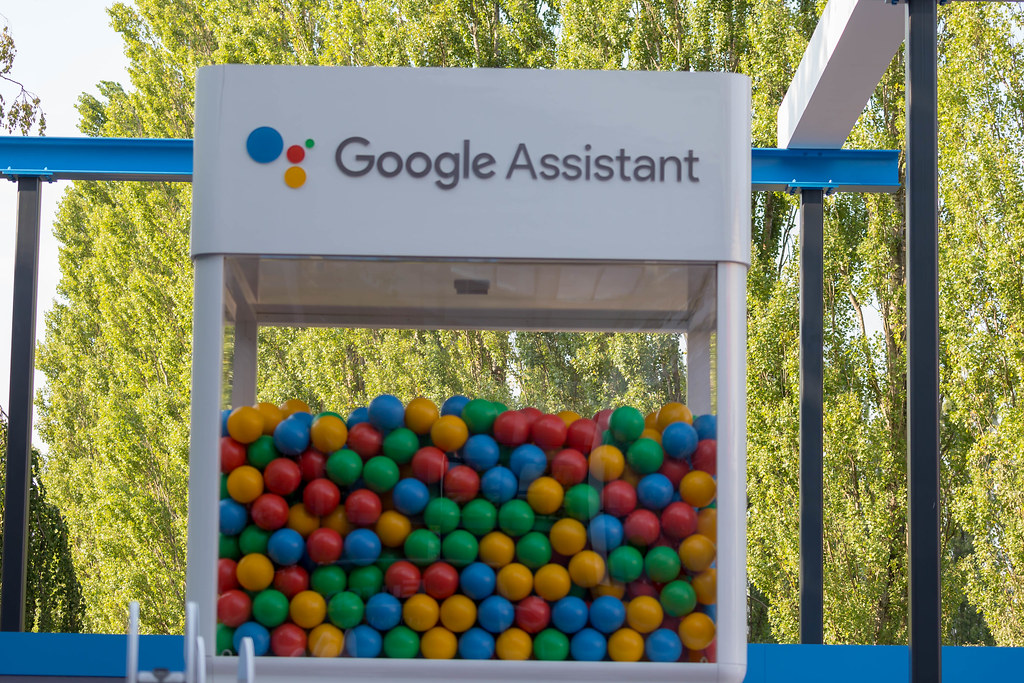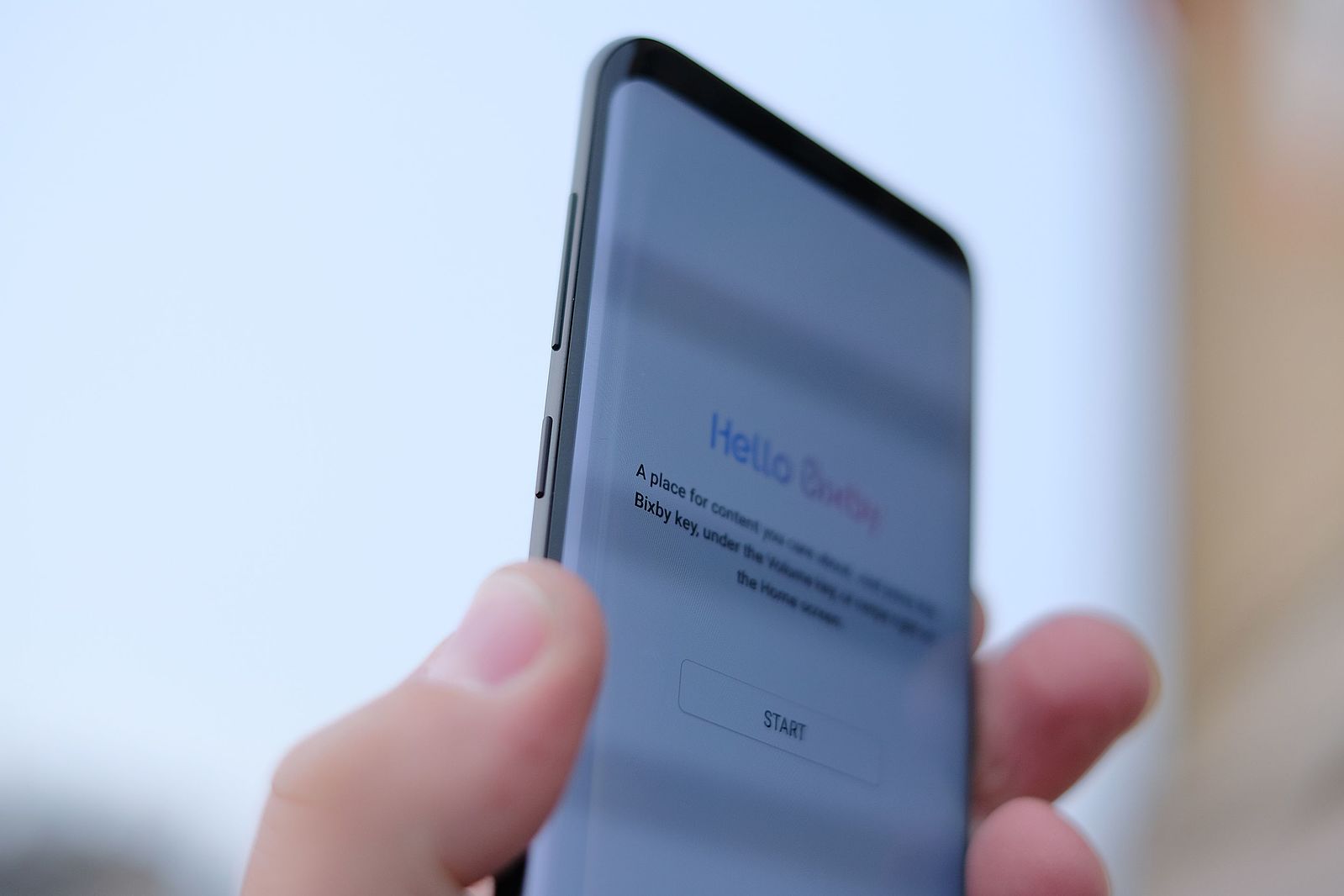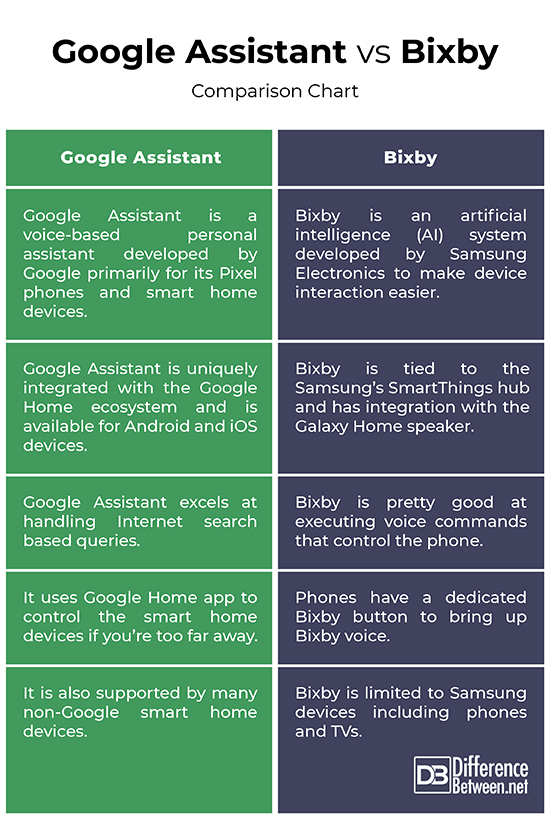Difference Between Google Assistant and Bixby
It is a race of the virtual assistants and with so many players out there fighting for the top spot, let’s take a look at how the two leading voice assistants stack up against one another. At one hand, we have the industry leading Google Assistant, the AI-powered voice service developed by Google, and on the other hand, we have the Bixby, a new virtual assistant by electronics giant Samsung.

What is Google Assistant?
Google Assistant is the name of the Google’s own AI-powered voice service that is primarily available on smartphones and smart home devices. It has the same functions as the others but offers more advanced assistant intelligence. It is a platform where you can create and deploy voice-enabled applications. It comes pre-installed with Android devices with version 6.0 or higher, including smartphones, tablets, Google Home, and other smart home devices. It was debuted during Google I/O developer conference in May 2016 as part of Google’s messaging app Allo, an instant messaging mobile app by Google, and its smart speaker Google Home. Google Assistant, just like its predecessor Google Now, uses natural language user interface to answer your queries, make recommendations, and perform actions by delegating requests to a set of services. Moreover, it also uses other services from the Alphabet/Google Company, as it provides access to Google’s ecosystem.

What is Bixby?
Bixby is an artificial intelligence (AI) system developed by Samsung Electronics to make device interaction easier and to avoid complexity of fully featured devices. Bixby is Samsung’s very own virtual assistant and the electronics giant’s new effort to offer an intelligent agent to compete with Google Assistant, Apple’s Siri, and Amazon’s Alexa. Like other voice-based virtual assistants out there, Bixby uses neural nets and deep learning to interpret what it should do based on what a person says or asks. It uses natural language processing to understand how we talk and what we mean. It basically means anyone with a Samsung smartphone or a Samsung TV will be able to use Bixby for a wide variety of tasks, queries, and capabilities, just like Google Assistant. Bixby is a major overhaul of the S Voice, the bundled voice command application that comes built-in with the Samsung Galaxy S5 and other devices.
Difference between Google Assistant and Bixby
Basics
– Google Assistant is a voice-based personal assistant developed by Google primarily for its Pixel phones and smart home devices. It is an AI-powered virtual assistant that comes pre-installed with Android devices with version 6.0 or higher, including smartphones, tablets, Google Home, and other smart home devices. It was debuted during Google I/O developer conference in May 2016 as part of Google’s messaging app Allo. Bixby, on the other hand, is Samsung’s very own virtual assistant and the company’s new effort to offer an intelligent agent to compete with Google Assistant, Apple Siri, Alexa and so on.
Integration
– While both Google Assistant and Bixby have similar smart assistant features, Google Assistant is uniquely integrated with the Google Home ecosystem and is available for Android and iOS devices (limited functionality on iOS), whereas Bixby is specific to Samsung devices and apps. Bixby is tied to the Samsung’s SmartThings hub and has integration with the Galaxy Home speaker. Google Assistant is supported by many smart home devices including Google Home and Google Home Hub, plus there are hundreds of other smart home devices that support Google’s voice-based service. When it comes to smart home integration, Bixby, unfortunately, is limited to the Samsung universe.
Strength
– Google Assistant excels in response time and handling internet search queries better than any other virtual assistant out there, including Samsung Bixby. Google Assistant is very quick to respond to queries such as turning on Bluetooth, looking for nearby restaurants, asking for traffic updates or weather information because search is one of Google’s main forte. In addition, Google Assistant also has strong integration with third-party apps such as WhatsApp. Bixby, on the other hand, is pretty good at executing voice commands related to phone and control functions within certain apps like Uber, Expedia, and so on.
Accessibility
– While Google Assistant is a powerful AI-powered personal assistant for handling everyday queries, users may have fewer reasons to go hands-free, especially when they are traveling. Voice dictation is one of the most common uses of Google Assistant for sending out texts and emails, but users find it more comfortable with their hands rather than going hands-free. Despite, the functions of Google Assistant are available for those with accessibility needs. Bixby is pretty good at executing voice commands because it uses neural nets and deep learning to interpret what it should do based on what a person says.
Google Assistant vs. Bixby: Comparison Chart

Summary of Google Assistant vs. Bixby
While both Google Assistant and Bixby are pretty much the same, when it comes to basic functionalities like executing voice commands to perform a wide range of tasks, Google Assistant is tied to the Google Home ecosystem, whereas Bixby is limited to the Samsung universe. Google Assistant also uses other services from the Alphabet/Google Company, as it provides access to Google’s ecosystem. Bixby does have an upper hand when it comes to understanding the context of the app you’re using. Google Assistant gives more natural responses when it comes to having a contextual conversation because search is one of Google’s main forte.
- Difference Between Caucus and Primary - June 18, 2024
- Difference Between PPO and POS - May 30, 2024
- Difference Between RFID and NFC - May 28, 2024
Search DifferenceBetween.net :
2 Comments
Leave a Response
References :
[0]Image credit: https://live.staticflickr.com/1847/43749809894_b6fd9e74e6_b.jpg
[1]Image credit: https://commons.wikimedia.org/wiki/File:Samsung_Galaxy_S8_Bixby.jpg
[2]Hughes, Bill. Samsung Galaxy S8 for Dummies. Hoboken, New Jersey: John Wiley & Sons, 2017. Print
[3]Lee, Henry. Voice User Interface Projects. Birmingham, United Kingdom: Packt, 2018. Print
[4]Kreutzer, Ralf T. and Marie Sirrenberg. Understanding Artificial Intelligence: Fundamentals, Use Cases and Methods for a Corporate AI Journey. Berlin, Germany: Springer, 2019. Print

Thank you for sharing this comparison. I only purchase Samsung cells & tablets. Yet, I use, unfortunately, Google’s assistant and apps. I am going to try Bixby and hopefully with my use I will be able to understand and enjoy Bixby moreso. I will say, why didn’t you say anything about the security between the two, watching our history – tracking etc.
As far as I have tried Bixby or any other A I app! Unless I’m missing something important it looks like all 3 AI apps can only respond correctly if you say exactly the words they know. You are limited to talking to a 6 month old child!!!